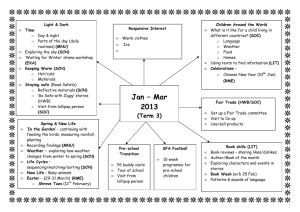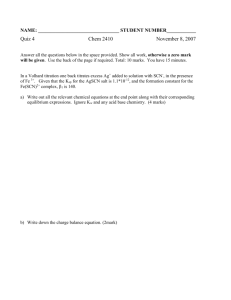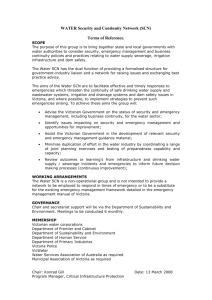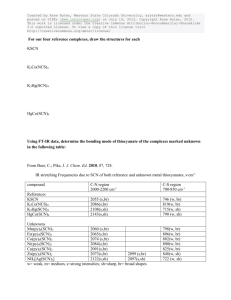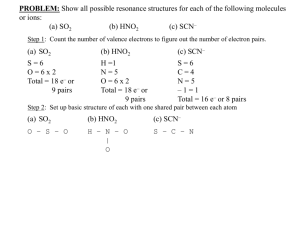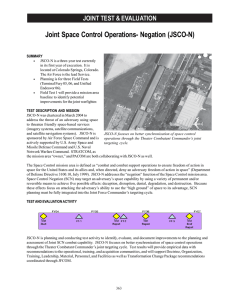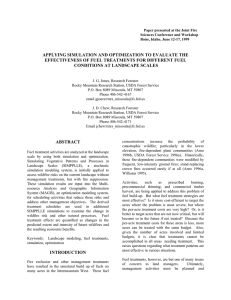Si P L Problem: Design and Evaluate Fuel Treatment Alternatives at the...
advertisement
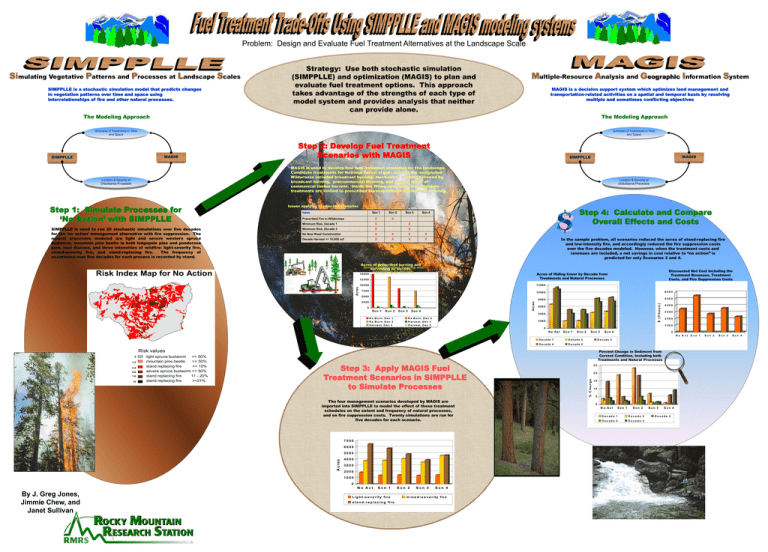
Problem: Design and Evaluate Fuel Treatment Alternatives at the Landscape Scale Simulating Vegetative Patterns and Processes at Landscape Scales SIMPPLLE is a stochastic simulation model that predicts changes in vegetation patterns over time and space using interrelationships of fire and other natural processes. The Modeling Approach Strategy: Use both stochastic simulation (SIMPPLLE) and optimization (MAGIS) to plan and evaluate fuel treatment options. This approach takes advantage of the strengths of each type of model system and provides analysis that neither can provide alone. Multiple-Resource Analysis and Geographic Information System MAGIS is a decision support system which optimizes land management and transportation-related activities on a spatial and temporal basis by resolving multiple and sometimes conflicting objectives The Modeling Approach Schedule of Treatments in Time and Space Schedule of Treatments in Time and Space MAGIS SIMPPLLE Step 2: Develop Fuel Treatment Scenarios with MAGIS MAGIS SIMPPLLE MAGIS is used to develop four fuel treatment scenarios for the landscape. Candidate treatments for National Forest stands outside the designated Wilderness included broadcast burning, mechanical thinning followed by broadcast burning, precommercial thinning, and several types of commercial timber harvest. Inside the Wilderness area, the candidate treatments are limited to prescribed burning without mechanical thinning. Step 1: Simulate Processes for ‘No Action’ with SIMPPLLE SIMPPLLE is used to run 20 stochastic simulations over five decades for the ‘no action’ management alternative with fire suppression. The natural processes modeled are light and severe western spruce budworm, mountain pine beetle in both lodgepole pine and ponderosa pine, root disease, and three intensities of wildfire: light-severity fire, mixed-severity fire, and stand-replacing fire. The frequency of occurrence over five decades for each process is recorded by stand. Location & Severity of Disturbance Processes Issues applying to selected scenarios Issue Scn 1 Scn 2 Scn 3 Prescribed Fire in Wilderness X X Minimum Risk, Decade 1 X X Minimum Risk, Decade 3 X X No New Road Construction X X X X Decade Harvest <= 10,000 ccf X X X X Step 4: Calculate and Compare Overall Effects and Costs Scn 4 In the sample problem, all scenarios reduced the acres of stand-replacing fire and low-intensity fire, and accordingly reduced the fire suppression costs over the five decades modeled. However, when the treatment costs and revenues are included, a net savings in cost relative to “no action” is predicted for only Scenarios 2 and 4. Acres of prescribed burning and Acres of prescribed burning and harvesting by decade. harvesting by decade. Risk Index Map for No Action 12500 Acres of Hiding Cover by Decade from Treatments and Natural Processes 10000 1 2 00 0 Acres 15000 7500 Discounted Net Cost Including the Treatment Revenues, Treatment Costs, and Fire Suppression Costs 1 0 00 0 6 00 0 8 00 0 5 00 0 5000 Acres 2500 0 S cn 1 S cn 2 S cn 3 S cn 4 $ (T hous ) 1 Location & Severity of Disturbance Processes 6 00 0 4 00 0 R x B u rn , D e c 1 R x B u rn , D e c 3 H a rve s t, D e c 2 R x B u rn , D e c 2 H a rve s t, D e c 1 H a rve s t, D e c 3 2 00 0 4 00 0 3 00 0 2 00 0 1 00 0 0 N o Ac t Scn 1 Scn 2 Scn 3 Scn 4 0 N o A ct D ecade 1 D ec a d e 2 D ecade 4 D ec a d e 5 D e c ad e 3 Percent Change in Sediment from Current Condition, Including both Treatments and Natural Processes Risk values 1-2 3-4 5-6 7-8 10 light spruce budworm >= 50% mountain pine beetle >= 50% stand replacing fire <= 10% severe spruce budworm >= 50% stand replacing fire 11 - 20% stand replacing fire >=21% Step 3: Apply MAGIS Fuel Treatment Scenarios in SIMPPLLE to Simulate Processes The four management scenarios developed by MAGIS are imported into SIMPPLLE to model the effect of these treatment schedules on the extent and frequency of natural processes, and on fire suppression costs. Twenty simulations are run for five decades for each scenario. 7000 ' 5000 A c re s 6000 4000 3000 2000 1000 0 No Act By J. Greg Jones, Jimmie Chew, and Janet Sullivan Scn 1 L ig h t - s e v e r it y f ir e s t a n d - r e p la c in g f ir e Scn 2 Scn 3 Scn 4 m ix e d - s e v e r it y f ir e 25 20 % C ha n g e 1 0 15 10 5 0 N o Act S cn 1 Scn 2 D ecad e 1 Decade 2 D ecad e 4 Decade 5 S cn 3 Scn 4 Decade 3 S cn 1 S cn 2 S cn 3 Scn 4
